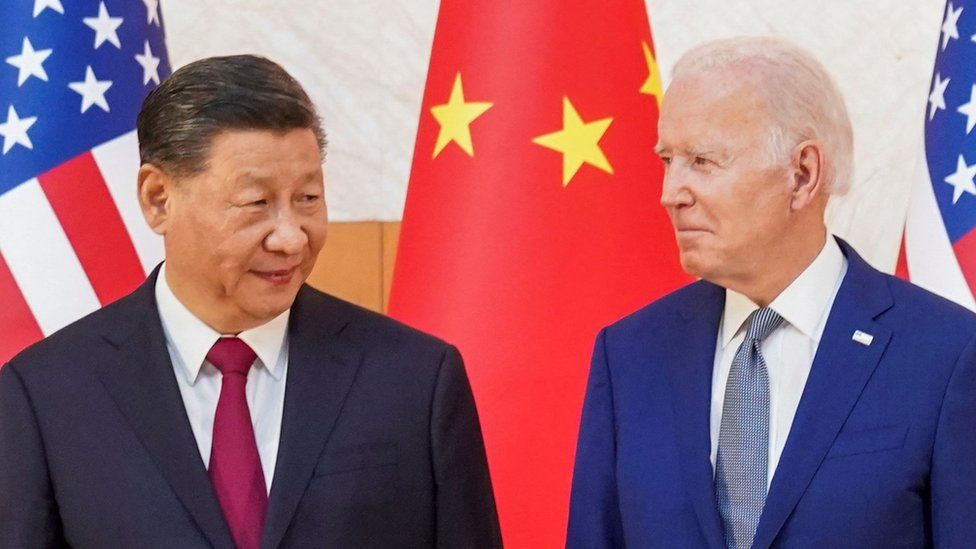
The first visit to China by US Secretary of State Antony Blinken comes nearly five months after a dramatic rift in ties over a Chinese surveillance balloon. His previous journey was abruptly canceled because the balloon, which China claims was a weather monitoring tool, drifted across the continental United States before being destroyed by American military jets.
Mr. Blinken’s tour includes discussions with China’s top foreign policy officials, but no word on whether he will also see Chinese President Xi Jinping, who appeared in Beijing with Microsoft founder Bill Gates on Friday. The two global heavyweights are concerned about several topics, including high-profile conflicts as well as possible areas of cooperation. Here are three major areas that could be near the top of the agenda.
US-China talks: Relationship repair
Mr. Blinken’s visit is primarily intended to re-establish diplomatic ties of any kind. When senior US officials convened in Vienna, Austria, last month, there was an initial breach in the ice. Mr. Blinken, though, is the most senior Biden administration official to visit China, and it is the first visit to Beijing by a US secretary of state since October 2018. In a pre-trip briefing, Deputy Assistant to the President and Coordinator for Indo-Pacific Affairs Kurt Campbell emphasized that discussing again now lessens the likelihood of conflict. High-altitude spying is a new low in US-China relations.
“We can’t let the disagreements that might divide us stand in the way of moving forward on the global priorities that require us all to work together.”
However, the Chinese reaction to Blinken’s visit has been chilly. According to the official Chinese account of a Wednesday night call with Mr. Blinken, Chinese Foreign Minister Qin Gang informed him that “it is very clear who is to blame” for the recent deterioration in relations.
“The United States should respect China’s concerns, stop interfering in China’s internal affairs, and stop undermining China’s sovereignty, security, and development interests in the name of competition,” Mr Qin reportedly said.
The United States has downplayed any substantial announcements that may result from this visit. In diplomatic terminology, it appears that the only “deliverable” from the discussions will be the fact that they took place at all. Can the United States exist in Xi Jinping’s world? Expect no breakthroughs or transformations in the way the two countries interact, according to Daniel J Kritenbrink, the State Department’s senior East Asia diplomat. If the meeting results in additional interaction between US and Chinese officials, that would be something both sides could build on.
Resolving trade disputes
President Biden’s relationship with China has been tumultuous, in part because he has been unwilling to reverse trade penalties implemented by his predecessor, Donald Trump. Import levies on Chinese-made goods amount to billions of dollars. Mr. Biden has squeezed even harder in some areas, such as limiting US computer chip exports to China in a bid to protect US leadership in the most advanced electronics technologies.
China retaliated by imposing its ban on computer memory chips manufactured by Micron, the world’s largest manufacturer. In the chip war, the United States is beating China. Mr. Campbell acknowledged China’s worries but stated that the US would defend and explain what it has done so far, as well as what may come next.
If computer technology is destined for a bitter rivalry between the two superpowers, the illicit drug trade may provide more opportunities for cooperation. The US wants to restrict the export of Chinese-made chemical components used in the production of fentanyl, a synthetic opioid many times more potent than heroin. In the previous seven years, the number of fentanyl-related overdose deaths in the United States has more than tripled. The US has asked China to assist in reducing drug mortality in the United States.
“This is a critical and urgent issue for the United States,” said Mr. Kritenbrink – but it presents its challenges.
Avoiding war
Following the balloon incident, there were allegations that China was considering shipping weaponry to Russia, where they would be deployed immediately in Ukraine’s battle. Recently, US government officials have moved away from those claims, reducing what could have been a very thorny topic between the two countries that risked turning the Ukraine-Russia conflict into a proxy war between the US and China.
However, Mr. Blinken is certain to repeat warnings issued to the Chinese in Vienna that providing military and financial support to Russia would have catastrophic implications. Warships from the United States and China have been engaged in a high-stakes game of chicken over the Taiwan Strait and the South China Sea. China claims the area as its own, while the United States maintains that it is in international waters.
The paradise islands are caught in the crossfire between the United States and China. Mr. Blinken and his diplomatic team have stated that the purpose of this trip is to “de-risk” tensions, and that renewed contact is a good place to start.
Achieving more may be difficult for Mr. Biden for the time being, and more broad cooperation may become more difficult for him as anti-China rhetoric in Washington heats up as the 2024 presidential elections approach. A successful outcome for both parties from this trip could simply be the establishment of communication channels that prevent an incident from escalating into a military war.
